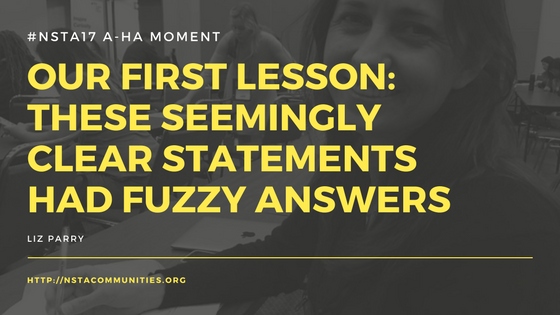Who Knew I
By Guest Blogger
Posted on 2017-04-01

The thing is, if you aren’t looking to broaden your knowledge and improve your practice, then stay away from the LA Convention Center and NSTA’s 2017 National Conference. I mean—stay away. Because when you walk into any door you are surrounded by a plethora of sessions, resources and exhibits. Oh, and did I mention the food trucks? Now that’s FULL service, NSTA!
Yesterday, I went to a variety of sessions that involved engineering in some way. One of my favorites—and one where I learned a lot—was led by Dr. Cary Sneider, a STEM expert and a lead on the development of the Framework for K-12 Science Education and the NGSS. The session was about Misconceptions about Engineering in the NGSS. In full disclosure, I consider(ed) myself somewhat of an expert on especially the engineering included in the NGSS. I led a review for ASEE (the American Society for Engineering Education) and have been using the standards in the bulk of my work as a P12 engineering education expert. So I’m not going to lie when I say I felt well, comfortable, about this session…maybe even a little smug.
Yeah, well that usually doesn’t work out the way. And it didn’t. Cary designed the session to have the audience members collaborate to complete some multiple-choice questions about engineering in the NGSS. He warned us that all the possible answers were at least somewhat right, and that we were to discuss them and choose what we thought was the best answer. Then we compared our results with another group, and finally, Cary reviewed the questions—and our answers—as a large group.
I was teamed up with a teacher from Mountain View, CA named Megan. Together we learned our first lesson: these seemingly clear statements had fuzzy answers. Yes, multiple choices could fit as an answer, or this part of (a) and that part of (c) were it. Megan and I discussed each one, and finally made choices. So when we compared our answers with the other team, color us surprised when the case they made for a different answer made sense. ARGH! Take it to the next level in the whole group discussion and clearly, much of the audience had struggled with the squishiness (yes, that’s a technical term). It was actually a bit disconcerting, as I know began to question myself.
Discoveries and Solutions Improve with Diverse Thinking
Near the end, Cary asked a brave lone dissenter why he’d chosen an answer. It was, after all, obvious he was wrong…..right? His reasoning, however, struck a chord. And all of a sudden, my perspective broadened. You could see from his face that Cary had the same reaction, and noted he’d simply never thought about it that way. He modeled, in exactly the right way, how to truly consider a different view and see it for the possibilities it presented.
Here’s the thing….in today’s education system being “right” is prized above all else, especially on tests in ELA and Math. As do scientists, engineers rely on data and evidence and as much as possible, try to minimize “squishiness.” But discoveries and solutions improve with diverse thinking. One of my favorite statements is a broader perspective on a solution team brings better solutions. Diversity, in all ways, matters. But perspectives tend to get fixed when answers are “right” or “wrong” , or when things “have always been that way” or when the way you’ve decided “it” is turns out to well, maybe not be just that way. It’s a little perplexing to have your perspective shift. But if you allow yourself to put that aside for just a moment it’s also invigorating, and squishy. And when you do all of this, and then model for others that it’s okay for the “expert” to still be learning—well, that’s perfect.
Author Liz Parry is a guest blogger for NSTA for the 2017 National Conference; follow Liz on Twitter @STEMninjaneer.
More About the 2017 National Conference on Science Education
Browse the program preview, or check out more sessions and other events with the LA Session Browser/Personal Scheduler. Follow all our conference tweets using #NSTA17, and if you tweet, please feel free to tag us @NSTA so we see it!
The mission of NSTA is to promote excellence and innovation in science teaching and learning for all.
Future NSTA Conferences
2017 STEM Forum & Expo
Kissimmee/Orlando, July 12–14
2017 Area Conferences
Baltimore, October 5–7
Milwaukee, November 9–11
New Orleans, Nov. 30–Dec. 2
Follow NSTA
Disclaimer: The views expressed in this blog post are those of the author(s) and do not necessarily reflect the official position of the National Science Teaching Association (NSTA).


